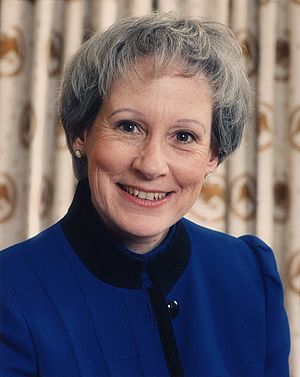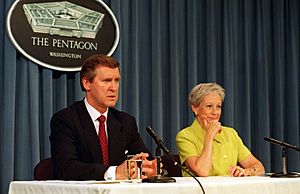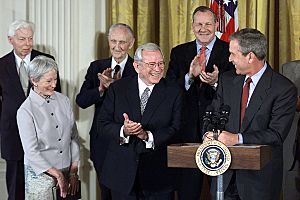Nancy Kassebaum facts for kids
Quick facts for kids
Nancy Kassebaum
|
|
|---|---|
 |
|
| Chair of the Senate Labor and Human Resources Committee | |
| In office January 3, 1995 – January 3, 1997 |
|
| Preceded by | Ted Kennedy |
| Succeeded by | Jim Jeffords |
| United States Senator from Kansas |
|
| In office December 23, 1978 – January 3, 1997 |
|
| Preceded by | James B. Pearson |
| Succeeded by | Pat Roberts |
| Personal details | |
| Born |
Nancy Josephine Landon
July 29, 1932 Topeka, Kansas, U.S. |
| Political party | Republican |
| Spouses |
|
| Children | 4, including William and Richard |
| Parent |
|
| Education | |
Nancy Kassebaum (born July 29, 1932) is a retired American politician. She represented Kansas in the United States Senate from 1978 to 1997. Her father, Alf Landon, was a governor of Kansas and ran for president. She was also married to former U.S. Senator Howard Baker.
When she won her election in 1978, Nancy Kassebaum became well-known. She was the only woman in the U.S. Senate at that time. She was also the first woman to represent Kansas in the Senate. She was also the first woman elected to a full Senate term without her husband having served in Congress before.
During her three terms, Kassebaum was known for being politically independent. This helped her work with both major parties. She helped create important laws about foreign affairs and issues at home. As a leader on the Senate Committee on Labor and Human Resources, she worked for big changes in health care. These changes made sure people could keep their health insurance when they changed jobs, even with existing health problems.
Contents
About Nancy Kassebaum's Early Life
Nancy Josephine Landon was born in Topeka, Kansas on July 29, 1932. Her mother was Theo Cobb, and her father was Governor Alf Landon. She went to Topeka High School and finished in 1950. In 1954, she graduated from the University of Kansas in Lawrence. There, she met her first husband, John Philip Kassebaum. They got married in 1955.
In 1956, she earned a master's degree in diplomatic history from the University of Michigan. They moved to Maize, Kansas, where they raised four children. Nancy Kassebaum worked as a vice president for Kassebaum Communications. This was a family business that owned several radio stations. She also served on the Maize School Board. In 1975, she and Philip separated, and their divorce was final in 1979. Kassebaum worked in Washington, D.C., for Senator James B. Pearson in 1975. She returned to Kansas the next year.
Nancy Kassebaum's Political Career
How She Was Elected
In late 1977, Senator Pearson said he would not run for re-election. This opened up a rare Senate seat. Many people wanted to run in the 1978 Republican primary. Nancy Kassebaum was one of them.
When she entered the race, she was separated from her husband. She decided to use the name Nancy Landon Kassebaum. This helped her use her father's good reputation in the state. She won against eight other Republicans in the primary election. Then, she defeated former Democratic representative William R. Roy in the main election. For the rest of her time in politics, she was known as Nancy Kassebaum. She was re-elected to the Senate in 1984 and 1990. She chose not to run again in 1996.
Her Time in the Senate
Key Issues She Worked On
From the start of her Senate career, Kassebaum was unique. She often voted moderately on social issues. But she was conservative on government spending. She tried to help reduce the large federal debt in the early 1980s. She became known as a central figure who could bring people together. She had a big impact on important issues both in foreign policy and at home.
Kassebaum is well-known for her health care law. It was called the Kennedy–Kassebaum Health Insurance Portability and Accountability Act. She worked on this bill with U.S. Senator Ted Kennedy from Massachusetts. She also worked on foreign policy. She strongly supported actions against apartheid in South Africa in the 1980s.

Foreign Relations Work
In 1981, Kassebaum became the leader of the Senate Subcommittee on African Affairs. She became involved in the debate about apartheid in South Africa. Apartheid was a system of racial separation and unfair treatment. She publicly asked President Reagan and other Republicans to be tougher on the white minority government in South Africa.
President Reagan did not like apartheid, but he was against using economic penalties. Many in Congress, including Kassebaum, wanted stronger action. To solve this, Kassebaum and Senator Richard Lugar worked with Democrats. They supported specific penalties against the South African government. They set goals, like demanding that African National Congress leader Nelson Mandela be released from prison.
This bill, called the Comprehensive Anti-Apartheid Act of 1986, passed easily in Congress. But President Reagan vetoed it. Kassebaum and Lugar then had to fight against their own party's leader. On September 29, 1986, the House voted to overturn Reagan's veto. The Senate did the same three days later. The bill became law with a strong vote of 78 to 21.
In March 1982, Kassebaum led a U.S. group to observe elections in El Salvador. The U.S.-backed government there was fighting rebels. The government also struggled to control human rights abuses. Many people voted on Election Day. This convinced Kassebaum that the rebels did not have wide public support.
Kassebaum became a key part of efforts to support El Salvador's government. This included giving economic and military help. She also pushed the government to improve human rights. She wanted them to make land reforms and stop the rebels. She often urged the Reagan administration to have a clear plan for peace. She wanted to avoid deeper U.S. military involvement in the region.
Domestic Policy Work
When Republicans gained control of Congress in 1994, Kassebaum became the leader of the Senate Labor Committee. This committee handled many issues within the country. One of her first actions was to introduce a health insurance reform bill. Senator Ted Kennedy, a Democrat, also supported it. The bill aimed to help about 25 million workers get and keep health insurance. This was important even if they had existing health problems or changed jobs.
During a year of intense discussions, Kassebaum sometimes disagreed with other Republicans. This included Senator Bob Dole from Kansas. She also pushed Kennedy and other Democrats to find common ground. In the end, lawmakers from both houses agreed on a final version of the bill. It was known as the Kassebaum-Kennedy Act, or the Health Insurance Portability and Accountability Act. The bill passed easily in both houses. President Clinton signed it into law on August 21, 1996.
In her last months in the Senate, Kassebaum also helped pass a new law. This law protected a beautiful area of Kansas tallgrass prairie. After more than 50 years of debate, the idea of a Tallgrass Prairie National Preserve became real. This happened just two months before Kassebaum left office. The new preserve covers 10,876 acres in the Flint Hills. It includes a native limestone house, barn, and school. Kassebaum's bill made the Tallgrass Prairie Preserve the only national park area dedicated to protecting wild tallgrass prairie. This type of prairie once covered a huge part of America.
Other Important Issues
Early in her career, Kassebaum was chosen to lead the 1980 Republican National Convention temporarily. She led the first two days of the convention. Her role was seen as a way for the Reagan campaign to connect with moderate parts of the party. In 1991, Time magazine mentioned Kassebaum as a possible running mate for President George H. W. Bush. This was if Vice President Dan Quayle was not chosen for the 1992 election.
Kassebaum voted to approve several Supreme Court judges. These included Sandra Day O'Connor, Antonin Scalia, Anthony M. Kennedy, David H. Souter, Clarence Thomas, Ruth Bader Ginsburg, and Stephen G. Breyer. She voted for Robert Bork, but his nomination was rejected. Later, Kassebaum said she regretted voting for Clarence Thomas in 1991. She was disappointed with his work on the court.
She voted for the bill that made Martin Luther King Jr. Day a federal holiday. She also voted for the Civil Rights Restoration Act of 1987. She even voted to overturn President Reagan's veto of that act.
Before finishing her third term, on December 7, 1996, Kassebaum married former U.S. Senator Howard Baker of Tennessee. He had retired from the Senate in 1985.
After Her Political Career
Kassebaum was chosen to be part of the American Philosophical Society in 1996.
After leaving the Senate, Kassebaum served on several important boards. These included the Robert Wood Johnson Foundation and the Kaiser Family Foundation. She also led the National Advisory Committee on Rural Health. She was involved with the George C. Marshall Foundation and the American-Turkish Council. Senator Kassebaum also served on the board of the National Committee on United States–China Relations.
Kassebaum continued to work on issues like campaign finance reform. She was on an advisory committee for campaign reform. In 1997, President Clinton asked Kassebaum and former Vice President Walter Mondale to help with bipartisan campaign finance reform. Their work led to suggestions for new campaign finance laws. These were given to Congress in October.
In 2000, Kassebaum was named co-chair of an advisory board for the Brookings Institution. This group made suggestions for reforms to a Senate committee.

From 2001 to 2005, Senator Baker served as the United States Ambassador to Japan. Kassebaum went with him and lived in Tokyo during this time. She was recognized for her work in Japan with Baker.
Kassebaum is an advisor for the Partnership for a Secure America. This group works to bring both parties together on national security and foreign policy. She is also a member of the ReFormers Caucus of Issue One.
She has been a critic of President Donald Trump. In 2018, she supported Laura Kelly, a Democratic candidate, for governor of Kansas. Kelly won that election. Kassebaum also supported Kelly's successful re-election in 2022. Kassebaum also supported Barbara Bollier, a Republican who became a Democrat, for the 2020 Senate election in Kansas. In 2014, Kassebaum said she supported same-sex marriage. In 2024, she supported Kamala Harris for president.
Awards and Honors
Kansas State University gave Kassebaum an honorary doctorate in 2015. Kansas State University also offers the Kassebaum Scholarship. This scholarship helps students who want to work in public service. Up to five students receive this award each year. Her connection to Kansas State University began in 1966. That's when the Landon Lecture Series started to honor her father, former Kansas Governor Alfred Landon. Her four children also went to Kansas State University.
Kassebaum was honored as a Distinguished Kansas in 1978. She received a Citation for Distinguished Statesmanship in 2000.
In 1985, Kassebaum received the Distinguished Service Citation from her old school, the University of Kansas.
In 1996, she was given an American Library Association Honorary Membership.
In January 2025, Kassebaum was one of twenty people to receive the Presidential Citizens Medal. President Biden mentioned her work with both parties in the Senate. He especially noted her work on health care reform.
Personal Life
In 1955, Kassebaum married John Philip Kassebaum. They had four children. They separated in 1975 and divorced in March 1979.
She then married former U.S. Senator and Diplomat Howard Baker of Tennessee on December 7, 1996. After leaving Tokyo in 2005, they divided their time. They lived between his home in Huntsville, Tennessee, and her home in Burdick, Kansas. Baker passed away on June 26, 2014.
Her son, William Kassebaum, used to be a member of the Kansas House of Representatives. Her other son, filmmaker Richard Kassebaum, passed away from a brain tumor on August 27, 2008, at age 47.
See also
 In Spanish: Nancy Kassebaum para niños
In Spanish: Nancy Kassebaum para niños
 | Selma Burke |
 | Pauline Powell Burns |
 | Frederick J. Brown |
 | Robert Blackburn |

